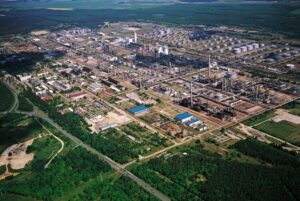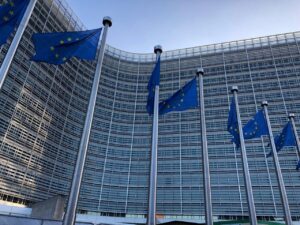The area of the former Soviet Union is particularly important for Russia, especially in the context of Ukraine, which is one of the main routes of Russian gas supplies to Europe. Moscow wants to take this role away from Poland’s eastern neighbors, trying to push through the controversial project of the Nord Stream 2 gas pipeline. To this end, it continues to destabilize the situation on the Dnieper, which is to undermine confidence in Kiev and deprive Ukraine of the role of a transit state. Ukraine is afraid that this may lead to a further escalation of the conflict in the east of the country – writes Piotr Stępiński, editor of the BiznesAlert.pl portal.
At the beginning of April, four years have passed since the pro-Russian separatists have been in conflict with the Ukrainian army in Donbass. Although the fights are still going on, the subject of Russian military activity in the east of Ukraine has significantly diminished. Meanwhile, every day the positions of Ukrainian troops are being fired, and not only soldiers, but also civilians are killed on the front. The conflict in the Donbass went into a state of freeze. So far, the Kremlin has been efficient in using frozen conflicts, which allowed it to influence geopolitics, among others in Nagorno-Karabakh or Transnistria. In the case of Ukraine, controlling the instability in the east of the country is to serve the Russians to undermine the confidence of their Western partners in Kiev, also in the energy context and gas supplies to Europe. One of the arguments used by the Russian side, explaining the construction of the controversial gas pipeline Nord Stream 2, is the instability of the political and economic situation on the Dnieper. That is why the Russians have repeatedly accused Kiev of illegally collecting raw materials destined for European customers. For this purpose, they used pressure manipulation in the transit pipeline, so that the Ukrainians would have to use their own gas reserves to ensure proper fuel transfer to Europe. This is part of Russia’s wider strategy towards Ukraine.
Nord Stream 2 is a threat to Ukraine
In an interview for BiznesAlert.pl, the director of international cooperation in Ukrtransgaz (operator of the Ukrainian gas transmission network – note) Ludmila Nesterenko argued that transit is important for Ukraine not only because it is responsible for 3 percent of Ukrainian GDP. – Depriving Ukraine of the role of a transit state increases the risk of Russia’s direct invasion of our country – she said. It is worth noting that the president of Naftogaz, Andrei Kobolev, spoke in a similar tone in the last interview for Deutsche Welle. – Russia wants to abandon transit through Ukraine for a very simple reason. Because transit causes that full military aggression to Ukraine is too expensive. The war could disrupt gas supplies to Western Europe for a long time. This would be reflected both in Russia’s image and financially – he said.
Also on the Vistula River there were opinions that the construction of Nord Stream 2 and depriving Ukraine of transit will have negative consequences for the security of our neighbors. In mid-February, the government plenipotentiary for strategic gas infrastructure Piotr Naimski said that depriving Ukraine of the role of a transit state, „first and foremost, it threatens to become an irrelevant state from the point of view of economic relations between the Russian Federation and Europe. In turn such a situation may cause that Russia’s interference in Ukraine’s internal affairs will intensify. It is a real danger. ” In turn, at the end of January Foreign Minister Jacek Czaputowicz warned that the construction of Nord Stream 2 would legitimize Russia’s activities in Ukraine and would also have a negative impact on Poland’s security.
Russia is playing Europe
The Russians play Europe using Nord Stream 2. This is an example of the effectiveness of Russian foreign policy. It can be said that in this situation, Europe appears in a sense as a hero of the Greek tragedy, in which it has a dilemma between values and interests, while the Russians are pulling the strings. Central and Eastern European countries that remember gas crises and Gazprom’s abuse of a dominant position on the market know that the construction of Nord Stream 2 is a political project aimed at depriving Ukraine of the role of a transit state and increasing dependence of this part of the continent on Russian fuel supplies. On the other hand, we have Germany, which argues that Nord Stream 2 is not motivated by political but economic reasons. In a recent interview for Handelsblatt, President Petro Poroshenko warned Germany against the implementation of Nord Stream 2, proposing to instead engage in the modernization project of the Ukrainian transmission network. At the same time, he said that the planned gas pipeline is a political project that is a „political bribe” in exchange for loyalty to Russia.
A few days later, during a press conference with the Ukrainian leader, German Chancellor Angela Merkel announced that during the last telephone conversation with Vladimir Putin she raised the topic of the Nord Stream 2 gas pipeline. Interestingly, for the first time the German Chancellor stated that it was not just an economic matter „but there are also political reasons”. In addition, in her opinion, this project is impossible to implement without specifying the future of gas transit through Ukraine. It is not known, however, how Berlin would enforce transit through the Dnieper on a political level, while it is involved in Nord Stream 2.
Gazprom is not telling the truth
This project, as it seems, will continue to be implemented, which is described in more detail in BiznesAlert.pl. Interestingly, according to Gazprom, the company never wanted to give up transit via Ukraine. – We have never talked about the resignation of transit through the territory of Ukraine. The Russian resource base is moving north and there will simply be insufficient resources to transfer existing fuel volumes through the central corridor. Therefore, transit may remain at the level of 10-15 billion cubic meters annually. At the same time, the Ukrainian side should present economic justification for signing a new transit agreement – said Alexei Miller, president of Gazprom.
It is worth recalling, however, that in 2014 he said that the company would provide necessary supply volumes to Ukraine, but transit to Europe would be carried out via alternative routes. – In fact, the role of Ukraine as a transit country is to be reduced to zero – Gazprom CEO said four years ago. Therefore, comparing these two statements, it can be seen that the Russians are not telling the truth claiming that they never wanted to deprive Ukraine of gas transit. Even so, transit even at the level of 10-15 billion cubic meters annually would mean the task of a final blow to Ukrainian pipelines that are able to send much larger volumes of the raw material. As a reminder, in 2017, 93,5 billion cubic meters were transited through the territory of Ukraine, although in the years 1991-2008 the volume of transit exceeded 100 billion cubic meters, and in 1998 reached the level of 141,1 billion cubic meters. In total, the transmission capacity of Ukrainian gas pipelines at the entry point is 288 billion cubic meters, and on the output of 178,5 billion cubic meters, of which 142,5 billion cubic meters towards European countries.
Read part two








